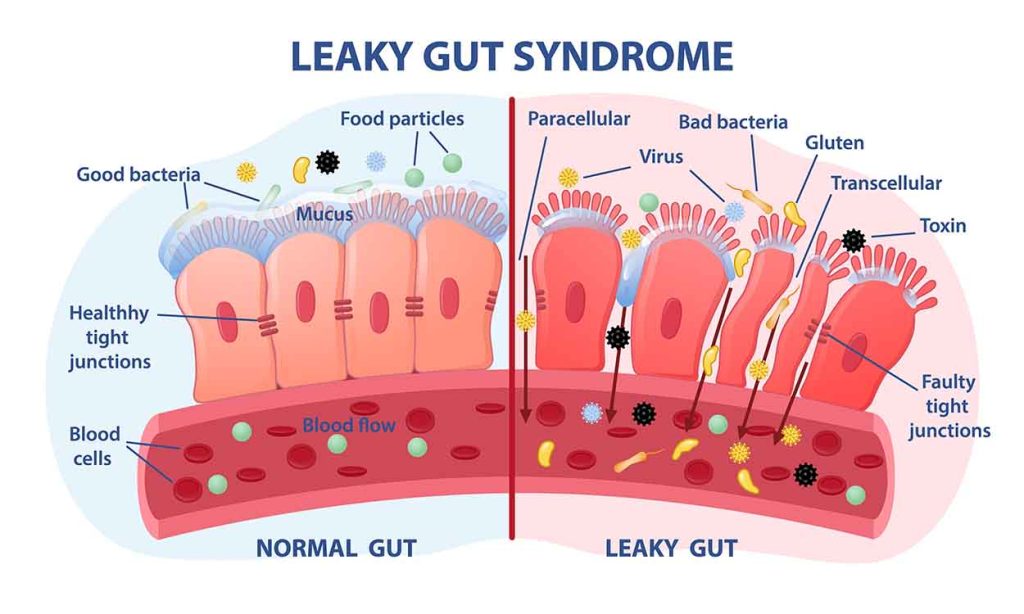“Leaky gut syndrome”, also known as intestinal permeability, is a complex and increasingly recognised condition that can have far-reaching impacts on your digestive and overall health. Identifying and assessing increased intestinal permeability is essential as it can cause or exacerbate other gastrointestinal conditions such as coeliac disease, Crohn’s, and irritable bowel syndrome (IBS). Some studies suggest that leaky gut syndrome may also be associated with other autoimmune diseases (lupus, type 1 diabetes, multiple sclerosis), chronic fatigue syndrome, fibromyalgia, arthritis, allergies, asthma, acne, obesity, and even mental health problems.
So what exactly is leaky gut syndrome? And could it be the reason why you’re experiencing bloating, stomach ache and fatigue?
We’ll explore the underlying causes, the role of functional medicine testing, and practical strategies to promote gut healing and restore balance. Whether you’re seeking to understand leaky gut syndrome better or looking for actionable steps to improve your gut health, this guide aims to provide insights and guidance based on the principles of functional medicine.
58% of people have experienced gut health problems, with 45% of those saying their issues are chronic (lasting more than 3 months).
What Is Leaky Gut Syndrome?
“Leaky gut syndrome”, or increased intestinal permeability, refers to a condition in which the protective lining of the intestinal walls becomes compromised, enabling the passage of undigested food particles, toxins, and bacteria from the gut into the bloodstream.
This breach in the intestinal barrier can trigger inflammation and disrupt the balance of gut microorganisms, potentially leading to various health problems beyond the digestive system, such as autoimmune disorders and systemic inflammation.
The complex gut lining, spanning thousands of square feet, usually acts as a selective barrier, regulating the entry of substances into the bloodstream. However, in leaky gut syndrome, this barrier is disrupted, allowing unwanted particles to penetrate tissues beneath, which can have far-reaching implications for overall health.

What Is The Role Of The Gut Barrier?
Your gut lining plays a vital role in the digestive process by absorbing water and nutrients from the food you eat into your bloodstream. This lining, made of mucous, is semi-permeable, allowing water, nutrients, and smaller molecules to pass through while acting as a barrier against larger molecules, bacteria, and potentially harmful substances. This barrier function is a key part of the immune system, preventing infectious agents from entering the body. The integrity of the gut lining is crucial for maintaining proper nutrient absorption and overall digestive health, as well a healthy immune system.
Moreover, the cells lining your stomach and small intestine release hormones regulate various digestive processes. These hormones control the production of digestive juices, signal hunger and fullness to the brain, and contribute to the overall functioning of the digestive system. A compromised gut lining can therefore also have a negative impact on the essential function of these cells and cause a cascade of health issues in the gut or other areas of the body.

What Are The Root Causes Of Leaky Gut Syndrome?
Gut inflammation – which can be enhanced by diet and and lifestyle factors such as stress – plays a significant role in intestinal permeability, however a leaky gut is usually the result of a convergence of several factors that contribute to the development of a compromised gut lining over time.
The root causes of leaky gut syndrome are multifaceted and often involve a combination of:
Dietary Choices
The modern Western diet is often comprised of a high intake of processed foods, such as those high in refined sugars, unhealthy fats, and artificial additives, that contribute to inflammation and compromise the integrity of the gut lining, increasing its permeability over time.
Moreover, people often eat foods they are intolerant to without being aware that they are intolerant. This is increasingly common and causes an immune response and inflammation that can further stress your gut health.
Gut Dysbiosis
Gut dysbiosis, an imbalance in your gut microbiota, can contribute to leaky gut syndrome by impacting the gut lining’s integrity. Disrupted microbial balance can lead to inflammation and weakened defence mechanisms in the gut, causing the gut lining to become more permeable. This increased permeability allows harmful substances to pass through, contributing to the development or exacerbation of leaky gut syndrome.
Chronic Stress
Prolonged stress – an increasingly common issue for people nowadays – can impact leaky gut syndrome by disrupting your gut-brain axis and gut flora. High levels of stress trigger the release of stress hormones that weaken your gut lining by producing inflammation. This process, coupled with alterations in gut microbial composition and immune responses under stress, contributes to the development or exacerbation of leaky gut syndrome.
Medication & Toxins
Certain medications, like nonsteroidal anti-inflammatory drugs (NSAIDs) and antibiotics, can disrupt the balance of the gut microbiota and potentially increase intestinal permeability. Exposure to toxins, such as pollutants and certain chemicals, can trigger inflammation and oxidative stress in the gut, further weakening the barrier function and contributing to the development or progression of leaky gut syndrome.

Book a Free Discovery Call
Discuss your health concerns with one of our expert practitioners and find out how personalised functional medicine can get your health on the right track.
How Does Functional Medicine Support Leaky Gut Syndrome?
Due to the various and interconnected root causes of Leaky Gut Syndrome, functional medicine practitioners use a variety of techniques to assess and identify leaky gut, and design treatment solutions to prevent further gut dysbiosis and support your gut microbiome.
 Personalised Nutrition
Personalised Nutrition
An in-depth clinical assessment of your eating habits by a functional medicine nutritionist is a little bit like having your faulty car inspected by an knowledgable and experienced mechanic!
These assessments not only identify potential problem areas in your diet (perhaps too much of a certain type of food, or nutrient deficiency), but also provide the information necessary for your practitioner to then individually tailor a food plan that focuses specifically on supporting your gut with nutrient-rich, anti-inflammatory foods, as well as prebiotic and probiotic-rich foods to nurture your gut microbiome.
 Balancing The Gut Microbiome
Balancing The Gut Microbiome
Functional medicine doctors prescribe personalised supplements protocols to be taken in conjunction with food to improve symptoms and restore healthy gut function.
Supplements like L-glutamine, zinc, quercetin, and collagen are known to support gut lining repair, while probiotics enhances the diversity and abundance of beneficial gut bacteria to support the gut microbiome.
 Stress Management
Stress Management
Aside from food and supplements, lifestyle modifications can help restore gut function.
At Nutrition Diets, we integrate Neuro-Linguistic Programming (NLP) and lifestyle coaching techniques into our therapy to discuss and work through stress factors, as well as recommending techniques to reduce stress and improve mood.
 Identifying Food Sensitivities
Identifying Food Sensitivities
A functional medicine approach uses a variety of methods to pinpoint trigger foods that exacerbate gut issues, including:
- nutritional assessment of a food diary
- eliminating suspected trigger foods
- using advanced functional testing
 Detoxification
Detoxification
Supporting the body’s natural detox pathways to reduce toxin buildup.
 Lifestyle Adjustments
Lifestyle Adjustments
Recommending regular exercise, adequate sleep, and hydration to foster overall health and wellbeing that is vital for all your interconnected body systems to function properly.
Functional Testing For Leaky Gut Syndrome
Functional medicine testing can provide valuable insights into the underlying causes and mechanisms of leaky gut syndrome. These tests go beyond conventional diagnostic methods to assess various aspects of gut health, enabling a more personalised and targeted approach to treatment.
Tests such as intestinal permeability assessments, stool analyses, and food sensitivity panels can identify the extent of gut barrier dysfunction, the presence of imbalanced gut flora, and specific food triggers that may contribute to inflammation and permeability.
These findings help clinicians design tailored interventions that address the root causes of leaky gut, such as dietary modifications, probiotics, and supplements, resulting in a more effective and comprehensive treatment strategy.
Functional medicine testing thus assists in identifying and addressing the factors contributing to leaky gut syndrome, ultimately promoting gut healing and overall health.
Book a Free Discovery Call
Speak to one of our gut health experts to find out which functional test is right for you.

YOUR HEALTH. YOUR CHOICE.
Addressing leaky gut syndrome through the lens of functional medicine offers a comprehensive and targeted approach to restoring your gut health and overall well-being. By recognising the interconnectedness between intestinal permeability and a range of health conditions, we can make timely interventions to prevent chronic disease from developing or progressing.
At Nutrition Diets, we specialise in identifying and correcting imbalances in our clients’ health using the functional medicine approach: balancing personalised nutrition and lifestyle plans, one-to-one therapy and at-home functional testing.
We offer thorough clinical assessment via easy and convenient online consultations. Getting started is simple and free. Take action today to get your health back on track.
